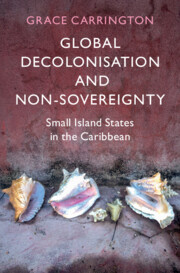Book contents
- Global Decolonisation and Non-Sovereignty
- LSE International Studies
- Global Decolonisation and Non-Sovereignty
- Copyright page
- Dedication
- Contents
- Maps
- Acknowledgements
- A Note on Terminology
- Abbreviations
- Introduction
- Part I Non-Sovereign States in the Context of Global Decolonisation
- Part II Local Dynamics of Decolonisation
- Appendix Timeline of Key Events
- Bibliography
- Index
Introduction
Published online by Cambridge University Press: 16 September 2025
- Global Decolonisation and Non-Sovereignty
- LSE International Studies
- Global Decolonisation and Non-Sovereignty
- Copyright page
- Dedication
- Contents
- Maps
- Acknowledgements
- A Note on Terminology
- Abbreviations
- Introduction
- Part I Non-Sovereign States in the Context of Global Decolonisation
- Part II Local Dynamics of Decolonisation
- Appendix Timeline of Key Events
- Bibliography
- Index
Summary
Non-sovereign territories today account for more than half the states in the Caribbean, but regional and global histories of the twentieth century tend to exclude them from narratives of protest and change. This book argues that our current understanding of global decolonisation is partial. We need a fuller picture that includes both independent and non-independent states and moves beyond a focus on political independence, instead conceptualising decolonisation as a process of challenging and dismantling colonial structures and legacies. Decolonisation is neither an inevitable nor a linear process but one that can ebb and flow as the colonial grip is weakened and sometimes restrengthened, often in new forms. Using the Cayman Islands, the British Virgin Islands, Martinique and Guadeloupe as case studies, Grace Carrington demonstrates that a focus on the processes of decolonisation in these non-sovereign states enriches our understanding of the global experience of twentieth-century decolonisation.
Information
- Type
- Chapter
- Information
- Global Decolonisation and Non-SovereigntySmall Island States in the Caribbean, pp. 1 - 24Publisher: Cambridge University PressPrint publication year: 2025
Accessibility standard: WCAG 2.0 A
Why this information is here
This section outlines the accessibility features of this content - including support for screen readers, full keyboard navigation and high-contrast display options. This may not be relevant for you.Accessibility Information
Content Navigation
Allows you to navigate directly to chapters, sections, or non‐text items through a linked table of contents, reducing the need for extensive scrolling.
Provides an interactive index, letting you go straight to where a term or subject appears in the text without manual searching.
Reading Order & Textual Equivalents
You will encounter all content (including footnotes, captions, etc.) in a clear, sequential flow, making it easier to follow with assistive tools like screen readers.
You get concise descriptions (for images, charts, or media clips), ensuring you do not miss crucial information when visual or audio elements are not accessible.
You get more than just short alt text: you have comprehensive text equivalents, transcripts, captions, or audio descriptions for substantial non‐text content, which is especially helpful for complex visuals or multimedia.
Structural and Technical Features
You gain clarity from ARIA (Accessible Rich Internet Applications) roles and attributes, as they help assistive technologies interpret how each part of the content functions.
